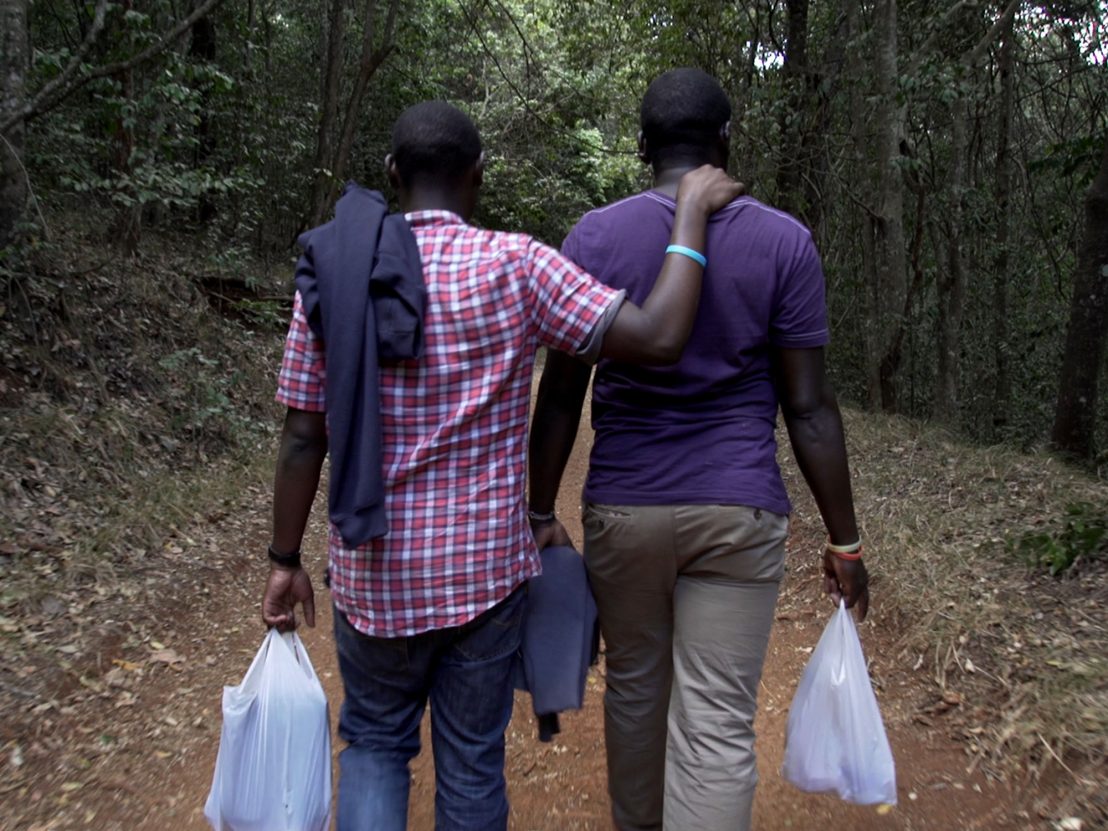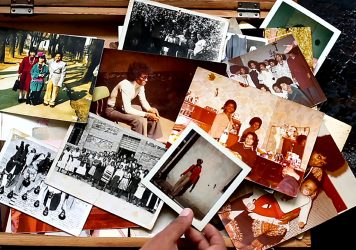
I Am Samuel tells the story of a young gay Kenyan man who moves to the capital, Nairobi, vividly captured in the frenetic energy of its busy market places, traffic-filled streets and cramped apartments. “It’s an overcrowded city, a bit claustrophobic, but it’s also where Samuel gets to be who he really is and finds his circle of friends,” says director Peter Murimi, who spent five years chronicling the lives of Samuel, his partner Alex, their chosen queer family in Nairobi, and Samuel’s biological family back home.
Samuel migrates to find a future that he is unable to pursue in his native village, which is contrasted against the city by lingering aerial shots depicting rich earth tones, sweeping fields and an almost meditative monotony of daily chores. “The village is beautiful, it’s expansive, but that’s where Samuel struggles the most with his parents,” adds Murimi. “There is a lot of tension. [The film] is a lot about what you see, not what is said. It’s about the body language.”
Murimi’s motivations for telling this story are somewhat personal. “The same gay dynamic Samuel is going through happened to someone really close to me,” he explains; as “someone who can be very useful to such families, it would be interesting for parents to understand their child and also sometimes for children to understand their parents.”
As well as showing how Samuel challenges traditional ideas of what it means to be a gay man, it was important to Murimi to depict the struggles that additional oppression, such as poverty, adds to an already precarious existence. “There is the issue of LGBTQ+ rights, and there is also a class issue, because if you are middle class that buys you some protection.”
Samuel has none of that safety, yet he must live his life regardless. He works a construction job while pursuing his dream of coaching netball, a passion passed on to Samuel by his mother. He is devoted to his faith, which some might assume would stand in opposition to his sexuality, stating “we embrace religion as much as you do, but we are still queer”. He surrounds himself with a group of queer friends, and within the confines of their safe space – Samuel’s apartment, adorned with rainbow flags – they each find release. And in Alex, Samul finds the love of his life. “We saw ourselves in each other,” he reflects, “we belong together.”
Interpreting things in her own way, Samuel’s mother refers to her son and Alex as “twins”. The relationship with his family is integral to Samuel’s multifaceted life. Murimi observes: “He got the least pressure from the women in the family so he was allowed to be himself, relaxed, loosening up. But with his father, there was so much tension, you could tell from their body language.” The levity Samuel is afforded when he’s with Alex is also present with these women; we catch glimpses of Samuel being momentarily unburdened by expectations of masculinity.
As we watch Samuel and his father observing the world around them, there is some solace in the way they mirror one another. The two men are often slightly withdrawn, silently watching others. According to Murimi, “Most of the time Samuel is the one people go to for reassurance in the group. But when people are sitting and talking in a group he will be one like, ‘I know who I am. I’m comfortable with myself. I don’t need to prove anything, I’ll just sit and watch the world.’” In this way, Samuel inadvertently fulfils his father’s patriarchal expectations – watching over his own non-traditional family.
According to Murimi, Samuel’s motivation for participating in the film was to provide a role model to young people like himself, so they might say, “I know someone living openly as a gay man and I’m gay and there’s nothing wrong with me.” Murimi is conscious of his role as an ally, someone outside of the community with a platform and an ability to shift conversations about the lives of frequently misunderstood people with their input. “I think I’m an ally; even during the making of the film I used to show the cut and share the footage, so they also participated in the feedback. It was a collaborative effort.”
I Am Samuel belongs to a wider movement of films fighting for LGBTQ+ rights. As a result, there is a very real fear that it will be banned, like previous Kenyan LGBTQ+ films, making it difficult to access for those who need it most. However, Murimi remains optimistic, buoyed by the positive reception to the film at various international festivals. “They’re getting so much love, getting so much admiration, which is really good for them.”
Published 13 Apr 2021

By Leila Latif
A new documentary gives a voice to the silenced natives in Joseph Conrad’s colonialist novel.

Levan Akin’s And Then We Danced has put LGBT+ rights centre-stage in the conservative, Orthodox country.

This year’s Film Africa event showed that African people are still not free to define their own identity abroad.